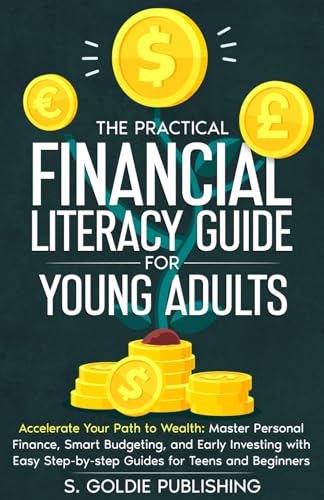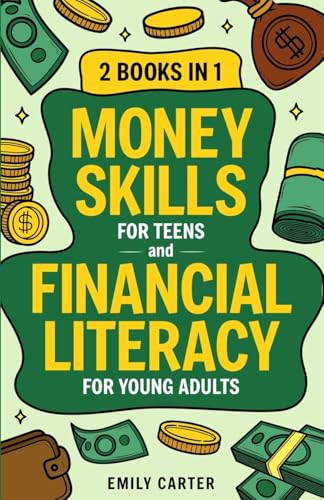Introduction to Financial Literacy
In today’s complex economic landscape, financial literacy has emerged as an essential skill set that many individuals lack. Despite its significance, this crucial aspect of personal finance is often overshadowed in traditional economics classes. Students are typically introduced to theories and models that govern economic principles, yet they frequently miss out on the real-world applications of these concepts. Consequently, this gap in education leaves many college students and young adults unprepared to navigate their own financial journeys.
Financial literacy encompasses a variety of skills, including budgeting, investing, understanding credit, and managing debt. These skills are vital for making informed decisions that can ultimately lead to financial independence. Young adults entering the workforce might find themselves with substantial student debt and limited knowledge of how to effectively manage their finances. This often leads to poor decision-making, which can have lasting repercussions on their financial well-being.
The reality is that while traditional economics classes focus primarily on theoretical frameworks, the demands of daily life require practical financial management. Individuals who possess financial literacy skills are better equipped to tackle challenges such as saving for retirement, understanding mortgages, and making informed investment choices. Without these skills, young adults risk falling into cycles of financial distress or missed opportunities for wealth accumulation.
Moreover, the lack of financial education is not solely a concern for personal finance management but also has broader implications for economic stability. A financially literate society is better positioned to contribute to economic growth and resilience. Therefore, it is imperative for educational curriculums to emphasize real-world finance skills that empower individuals to make sound financial decisions. Embracing financial literacy enhances individuals’ autonomy over their economic futures and fosters a more informed citizenry.
The Basics of Budgeting
Establishing a realistic budget is the cornerstone of managing personal finances effectively. A well-structured budget helps individuals, particularly college students, track their income and expenditures, ensuring their financial health is maintained throughout their academic journey. The first step in creating a budget is to identify and document all sources of income—this may include part-time jobs, allowances, and any financial aid. Having a clear understanding of one’s total income lays the groundwork for subsequent budgeting activities.
Following the assessment of income, the next vital step is to track expenses. This involves recording both fixed and variable expenditures. Fixed expenses are those that remain constant each month, such as rent or tuition fees, while variable expenses can fluctuate, including groceries, entertainment, and dining out. Tools like budgeting apps or simple spreadsheets can assist in easily categorizing and monitoring these expenses. For instance, a college student might allocate a monthly budget for groceries based on previous spending patterns, ensuring they do not overspend and deplete their funds too early in the month.
Setting financial goals is equally pivotal in the budgeting process. These goals can be short-term, such as saving for a weekend trip, or long-term, like preparing for post-graduate expenses. Clearly defined objectives can motivate individuals to adhere to their budgets and make conscious spending decisions that align with their financial aspirations. It’s important to establish realistic spending limits for various categories, such as entertainment or fast food, to stay within overall financial constraints.
In conclusion, budgeting may appear challenging, but with consistent tracking of income, careful monitoring of expenses, and clear financial goals, individuals can cultivate stronger financial habits that last beyond their collegiate years. By taking ownership of their budgets, students can enhance their financial literacy and navigate the complexities of real-world finance with confidence.
Understanding and Managing Credit Scores
A credit score is a numerical representation of an individual’s creditworthiness, typically ranging from 300 to 850. It plays a critical role in making various financial decisions, influencing interest rates on loans, rental applications, and even employment opportunities. Understanding how credit scores work is crucial for managing personal finances effectively. The score is calculated based on factors such as payment history, amount owed, length of credit history, types of credit used, and new credit inquiries. Each component carries a different weight, which impacts the overarching score.
To build and maintain a good credit score, individuals should focus on several practical strategies. First and foremost, timely bill payments contribute positively to one’s credit history. Utilizing automated payments or reminders can help ensure no payment is missed. Additionally, keeping credit card balances low relative to the credit limit—ideally below 30%—can also enhance a credit score. This ratio, often referred to as credit utilization, is a key factor that credit scoring models consider.
Another common misconception is that closing old credit accounts will improve one’s credit score. In reality, longer credit histories can signal reliability, meaning that maintaining older accounts may benefit one’s score. Periodically checking credit reports for inaccuracies is also essential, as erroneous entries can negatively affect the score. By correcting any discrepancies promptly, individuals can ensure their credit profiles accurately reflect their financial behavior.
Understanding and managing one’s credit score is not just about achieving high numbers; it is about fostering a responsible financial future. By remaining informed on the elements that contribute to their score and implementing best practices, individuals can navigate their financial journeys with greater confidence and success.
Negotiating Bills and Expenses
Many individuals overlook the potential savings obtainable through effective negotiation of their bills and expenses. In a world where financial management is crucial, learning to negotiate can significantly alleviate the burden of recurring payments such as rent, utilities, and student loans. The first strategy involves conducting research on alternative service providers or loan terms. By understanding the competitive landscape and available options, individuals can better position themselves when engaging in negotiations.
When approaching negotiations, it is essential to communicate clearly with service providers. Start by gathering specific data that illustrates the market rates for similar services. Additionally, consider identifying any loyalty programs or discounts that may apply to your situation. Presenting these facts in a straightforward and respectful manner helps build trust and may lead to a more favorable outcome. Consider preparing a script or key talking points before contacting service providers; this preparation can help articulate your needs while allowing for a structured dialogue.
It can be beneficial to frame the conversation around mutual benefit. For example, if discussing your rent payment, express appreciation for the landlord’s services while conveying the importance of adjusting your payment due to recent financial challenges or market shifts. Role-playing these conversations with a friend can significantly enhance your comfort level and technique. In doing so, you’ll be more prepared to confidently advocate for yourself in real-life scenarios.
In addition to verbal communication, written correspondence can also serve as a powerful tool. Drafting an email that outlines your request, backed by researched data, may prompt the service provider to consider your proposal more seriously. By employing these strategies, individuals can effectively negotiate their bills, thereby improving their financial situation and fostering a sense of empowerment in managing personal finances.
Avoiding Lifestyle Creep
Lifestyle creep is a common phenomenon that tends to affect individuals as their income increases. The allure of resolving one’s financial difficulties often leads to overspending, where individuals may feel compelled to upgrade their living standards and consumption habits. This can manifest as moving into a more expensive apartment, purchasing a new car, or indulging in frequent dining experiences—all tempting opportunities that can elevate one’s financial strain if not properly managed. To mitigate the negative consequences of lifestyle creep, it is essential to maintain a balanced perspective on needs versus wants.
One of the key strategies to avoid falling into the lifestyle creep trap is to establish a budget that clearly delineates essential expenditures such as housing, groceries, and necessary utilities from discretionary spending like entertainment, dining, or luxury items. By consistently tracking monthly expenses, young adults can reinforce their financial awareness and evaluate whether their spending aligns with their long-term goals. For example, if a recent graduate secures a higher-paying position, rather than immediately upgrading to a luxury apartment, they could consider holding onto their current living situation while directing the additional income towards savings or investments. This approach not only fosters financial stability but also cultivates a habit of prudent spending.
Additionally, practicing mindfulness regarding lifestyle choices can help ground individuals during times of increased income. Engaging in simple activities, such as cooking at home or enjoying outdoor activities, can serve as fulfilling alternatives to expensive outings and purchases. It’s worthwhile to reflect on personal values and priorities, ensuring that spending aligns with long-term objectives rather than temporary desires. By staying conscious of financial goals, such as saving for retirement or creating an emergency fund, individuals can navigate their growing incomes judiciously and remain financially secure amidst the societal pressures that accompany lifestyle enhancements.
The Power of Compound Interest
Compound interest is a fundamental financial principle that plays a pivotal role in wealth accumulation. Essentially, it refers to the process of earning interest on both the initial principal and the interest that has previously been added. Unlike simple interest, which is calculated only on the principal amount, compound interest allows your savings to grow at a faster rate over time. This effect can be observed through examples that highlight the significance of starting early in your savings journey.
To illustrate the power of compound interest, consider a young adult who begins investing $1,000 at an annual interest rate of 5%. If this individual allows the investment to grow for 30 years without contributing additional funds, they would generate approximately $4,321. This figure stems from the fact that each year, the interest is calculated based on the growing total, which includes both the initial investment and the interest accrued in previous years. This exponential growth demonstrates why the earlier one begins saving, the more significant the financial advantages can be over time.
For those looking to harness the benefits of compound interest, it is advisable to start a savings plan at the earliest opportunity. High-yield savings accounts or certificates of deposit (CDs) can provide competitive interest rates and an excellent foundation for compounding. Even small contributions can accumulate to substantial amounts if invested wisely. Moreover, setting up automatic transfers to your savings account fosters disciplined saving habits, ensuring consistent contributions.
In summary, understanding and utilizing the power of compound interest is crucial for young adults seeking to build wealth. By starting to save early and taking advantage of high-yield accounts, individuals can harness this powerful financial tool to secure a more prosperous future.
Common Financial Mistakes to Avoid
As young adults transition into financial independence, they often encounter several pitfalls that can significantly impact their financial health. One prevalent mistake is living beyond one’s means. In an age of social media and consumerism, it can be tempting to spend lavishly in order to keep up with peers. This tendency can lead to accumulating debt, particularly through credit cards, which often carry high-interest rates. It is crucial to establish a budget that reflects your actual income and necessary expenses, thereby allowing for responsible spending without exceeding financial limits.
Another frequent error is the failure to establish an emergency fund. Emergencies, such as medical expenses or unexpected job loss, can arise at any time and without a financial safety net, individuals may resort to borrowing at unfavorable rates or neglecting essential bills. A common recommendation is to aim for saving three to six months’ worth of living expenses in a separate account, which can help in navigating unforeseen financial challenges without resorting to debt.
Furthermore, many young adults neglect the importance of investing early in their lives. While the immediate focus often lies on daily expenditures, investing even small amounts can yield significant returns over time. Utilizing retirement accounts like a 401(k) or an IRA can provide compounding advantages that ultimately contribute to long-term wealth accumulation.
It is also vital to avoid ignoring financial education. Many individuals skip learning about personal finance due to a mistaken belief that economics taught in school suffices. However, actively seeking knowledge through books, online resources, or financial workshops can provide valuable insights into effective budgeting, saving, and investing strategies. By recognizing these common financial mistakes and approaching with a proactive mindset, young adults can lay a solid foundation for their financial future.
Resources for Continued Learning
Improving financial literacy requires ongoing education and access to reliable resources. A multitude of books, podcasts, websites, and apps are available to enhance one’s knowledge and foster better money management skills. By leveraging these tools, individuals can cultivate a deeper understanding of personal finance and make informed decisions regarding their financial futures.
Starting with literature, a selection of well-reviewed books can be particularly beneficial. Works such as “The Total Money Makeover” by Dave Ramsey, provide actionable strategies for managing debt and cultivating wealth. Similarly, “Rich Dad Poor Dad” by Robert Kiyosaki offers insightful perspectives on financial independence and investing. Delving into these texts equips readers with fundamental principles that extend beyond traditional economic education.
Podcasts present an engaging format for acquiring financial knowledge on-the-go. Programs like “The Dave Ramsey Show” and “Smart Passive Income” deliver expert advice on budgeting, saving, and creating passive income streams. These resources often feature personal stories and real-world applications that make complex financial concepts more relatable and easier to understand.
Online platforms also contribute significantly to financial literacy. Websites such as Investopedia and NerdWallet provide valuable articles and tutorials that break down various financial topics, from investing to retirement planning. These resources often include calculators and tools to assist individuals in practical money management. Additionally, platforms like Coursera and Udemy offer online courses covering personal finance, investment strategies, and economic principles.
Finally, mobile applications such as Mint and YNAB (You Need A Budget) empower users to track their spending, create budgets, and set financial goals. These tools can simplify complex aspects of finance, making it easier to manage personal finances effectively. Emphasizing that financial literacy is a lifelong journey, engaging with these resources can significantly enhance one’s ability to navigate the financial landscape efficiently.
Conclusion and Encouragement
In reflecting upon the financial insights discussed throughout this blog post, it is crucial to recognize the importance of acquiring real-world finance skills that often go unaddressed in traditional economics classes. We have explored various aspects of financial literacy, including the significance of budgeting, the impact of credit scores on financial health, and the potential benefits of investing. These topics are not merely academic; they represent essential tools that young adults can use to navigate their financial journeys effectively.
Being financially literate equips individuals with the knowledge to make informed decisions about their money, ultimately leading to enhanced financial stability and autonomy. By understanding the principles of budgeting, for instance, you can better allocate your resources, control your spending habits, and set financial goals that are both attainable and meaningful. Furthermore, monitoring one’s credit score is a vital practice; it empowers you to understand how your financial behaviors impact your broader financial future.
We encourage you to take charge of your financial situation by implementing the tips shared in this post. Start today—consider creating a budget that reflects your income and expenses, and take the necessary steps to check and manage your credit score regularly. Seeking out additional resources, such as financial workshops or online courses, can further supplement your knowledge and confidence in managing your personal finances.
By prioritizing financial literacy and taking proactive steps towards understanding your finances, you can build a secure future. Embrace the responsibility of your financial journey, and remember that the lessons you have gained can pave the way for a more financially stable and prosperous life.
Think your econ class covered everything about money? Think again.
The books below dive into the real-world stuff—like how to budget on a student income, build credit, avoid debt traps, and make smart money moves early.
They’re written for students and young adults who want practical advice, not just theory.
- No confusing jargon
- No boring lectures
- Just clear, helpful tips you can actually use
If you’re ready to feel more confident with your finances, click on a book below and start learning what school didn’t teach you.




